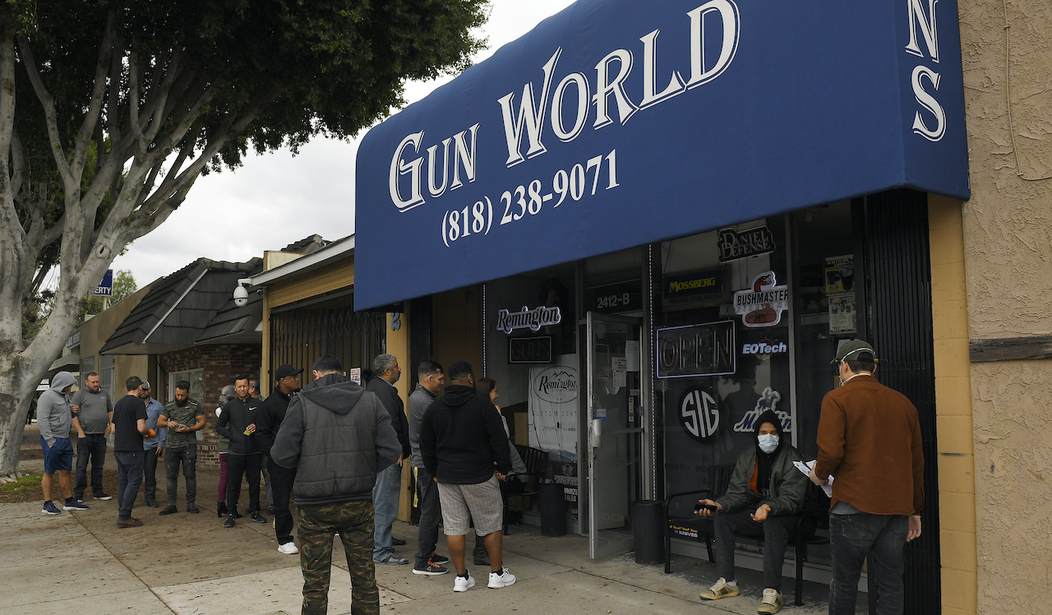A decision by a three-judge panel on the Ninth Circuit Court of Appeals declaring the closures of gun stores in two California counties during 2020’s COVID-related lockdowns unconstitutional is almost certainly headed for an en banc review, and given the anti-gun majorities still present in the appellate court, chances are good that the original decision is going to be overturned and replaced with an opinion more to the liking of the gun prohibitionists in the state.
In fact, as Ninth Circuit Judge Lawrence VanDyke has pointed out, since 2008 the Ninth Circuit is 50-0 when it comes to en banc decisions upholding gun control laws. Most of the time the court uses “intermediate scrutiny” to uphold the validity of the Second Amendment restrictions; a vague and fuzzy legal standard that in essence allows courts to give the thumbs up to infringements on our right to keep and bear arms as long as the government argues that the law is based on a legitimate government interest and doesn’t “substantially” burden the exercise of our Second Amendment rights.
VanDyke is well aware of the games the court has played with intermediate scrutiny; so much so, in fact, that he decided to use his judicial pen to push back against his colleagues’ penchant for upholding any and all gun control laws with the flimsiest of legal arguments. In VanDyke’s opinion declaring the gun stores’ closures unconstitutional (also using intermediate scrutiny, the Ninth Circuit judge actually wrote an alternative ruling to demonstrate just how easy it is to use that legal rationale to reach any conclusion it wants.
Since our court’s Second Amendment intermediate scrutiny standard can reach any result one desires, I figure there is no reason why I shouldn’t write an alternative draft opinion that will apply our test in a way more to the liking of the majority of our court. That way I can demonstrate just how easy it is to reach any desired conclusion under our current framework, and the majority of our court can get a jump-start on calling this case en banc. Sort of a win-win for everyone.
Over at Reason, law professor Josh Blackman calls VanDyke’s exercise in legal absurdity a “masterpiece” at pointing out the vapidity of the Second Amendment scholarship offered by the Ninth Circuit’s majority. You can read the opinion in its entirety here, and I’d encourage you to check it out when you have a few minutes. VanDkye isn’t a dry and ponderous jurist at all, and his “alternate” opinion contains plenty of footnotes dripping with sarcasm and stinging rebukes of his colleagues’ continued refusal to treat the Second Amendment as a fundamental right, like this bit taking on the Ninth Circuit’s two-pronged test for gun laws:
Here’s the deal: Whenever we think the history helps us in upholding the challenged regulation, we’re happy to rely on it in step one of our test. See, e.g., Young, 992 F.3d at 784–826. But most of the time the history either doesn’t help us uphold the gun regulation, is indeterminate, or is just really hard to evaluate. So usually we just skip over step one of our “two-step” test by assuming the challenged regulation burdens Second Amendment-protected conduct. But that’s okay, because the real beauty of our two-step test is its amazing flexibility at the various stages of step two in balancing the government’s asserted interest versus the claimed impact on the “core” of the Second Amendment.
VanDyke also had a wonderfully sarcastic take on the second step in the interest-balancing analysis.
It is important to recognize that all the real work in our Second Amendment test is done right here. First, notice how much discretion this test gives us judges! There is so much flexibility in deciding whether anything short of an outright permanent ban (which nobody is dumb enough to enact anymore) places a “severe burden” on the Second Amendment. We can always point to stuff that isn’t banned in concluding this particular regulation isn’t a “substantial burden.” And second, once we’ve concluded that a challenged regulation does not place a “substantial burden on Second Amendment rights,” it’s really game over. A regulation that we’ve already determined does not substantially burden the Second Amendment can be upheld easy-peasy under our watered-down intermediate scrutiny test.
I can’t imagine that VanDyke’s opinion has made him many friends at work, but he did an absolutely fantastic job of pointing out the absurdities of the prevailing attitudes within the Ninth Circuit when it comes to our right to keep and bear arms. Will it be enough to keep an en banc panel away from the case? Probably not, though Blackman suggests that the appellate court may actually decide to take a pass, given the flagrant infringements on the right to keep and bear arms that come with keeping gun stores closed for nearly two straight months because a government official decided they were “unessential.” I’m not holding my breath waiting for that to happen, but like VanDyke, I’m curious to see if there’s any gun control law that the Ninth Circuit would declare goes too far. Since Heller, they’ve had 50 chances to take that step and have declined to do so, so maybe the 51st time will be the charm.









Join the conversation as a VIP Member